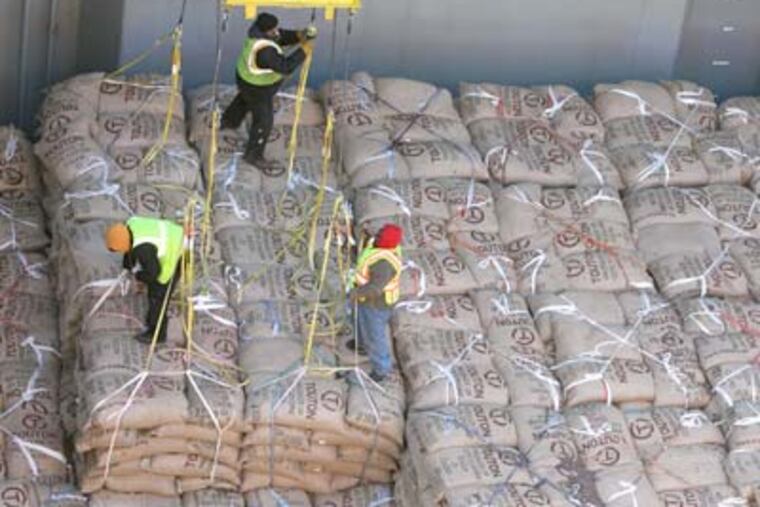Chocolate port; cocoa ship unloads in Camden
Even as a ban on cocoa exports was declared Monday in the West African nation of Ivory Coast, the largest cocoa ship ever to sail from there to the United States was in Camden, unloading 18,600 metric tons of the beans destined to become succulent chocolate, creamy icings and cakes.

Even as a ban on cocoa exports was declared Monday in the West African nation of Ivory Coast, the largest cocoa ship ever to sail from there to the United States was in Camden, unloading 18,600 metric tons of the beans destined to become succulent chocolate, creamy icings and cakes.
The effects of the one-month ban are unclear, but officials say the maiden voyage of the Atlantic Tramp still bodes well for the Camden and Philadelphia ports, which receive 70 percent to 80 percent of all U.S. cocoa bean imports from Ivory Coast - the world's largest cocoa producer - Ghana and Indonesia.
The Philadelphia region is a hotbed for chocolate processing and manufacturing.
The Tramp brought 283,360 140-pound burlap bags of cocoa worth $60 million and representing 150,000 small farms in the Ivory Coast.
It docked Saturday night and will be unloaded over seven days by more than 100 longshoremen, dock and warehouse workers.
"We have three gangs working 10-hour days on this vessel because of the size and the amount of cargo," said Michael Billups, vessel operations manager for Delaware River Stevedores. "This ship is three times bigger than a typical cocoa bean ship."
Jeffrey Wheeler of Camden International Commodities Terminal, the warehouse distribution operator, said, "Every bag will have two people touching it. The supply chain itself is pretty amazing."
Within 100 miles of the Delaware River are 80 percent of the processing plants that grind raw beans into cocoa powder, cocoa butter, and chocolate ingredients to make candy, ice cream, cookies and cakes.
The big five cocoa processors in the area are: Blommer Chocolate Co. in East Greenville; Barry Callebaut AG in Eddystone and Pennsauken; Cargill Cocoa & Chocolate in Lititz; Archer Daniels Midland Co. in Hazleton, and Mars Inc., maker of M&M candies, in Elizabethtown, Pa. and Hackettstown, N.J.
These cocoa companies, in turn, sell to confection manufacturers: Hershey Co., Mars Snackfood, Kraft Foods on Roosevelt Boulevard, Tasty Baking Co., Asher's Chocolates and Goldenberg Peanut Chews, all in this region.
Meanwhile, political tension in the Ivory Coast threatens to disrupt future shipments, after the president-elect Monday ordered a ban on cocoa and coffee exports for a month - to cut off funds to the incumbent president, who refuses to step down. There was no guarantee that growers would comply, but cocoa climbed in New York Monday to its highest price in almost a year.
"We don't expect any interruption," Camden International's Wheeler said. "The cocoa we are dealing with in our next few ships was already bought and paid for. They are saying they will load anything that's been contracted. But new contracts, they won't."
If the strife drags on, and doing business in the Ivory Coast becomes more difficult, companies in the cocoa industry - and Delaware River ports - could face supply problems.
All cocoa on the Atlantic Tramp has been bought by Blommer Chocolate, North America's largest cocoa processor.
"The majority of the cocoa on board comes from local farmers and farmer cooperatives in the region that Blommer has direct relationships with," said Kip Walk, director of Blommer's cocoa department.
"This ship represents the work we are doing with the farmer cooperatives in the Ivory Coast. This cocoa can be directly linked to those cooperatives, and it is helping improve the farming community in the region," Walk said.
On Monday, giant cranes hoisted slings of 25 burlap bags at a time from the ship onto flatbed trucks. At warehouses, the beans will be removed from bags and loaded into trucks or "hopper" railcars for travel.
Annually, 400,000 tons of cocoa beans come to the United States. Of that, 150,000 tons come through Beckett Street Terminal in Camden, and an additional 150,000 tons pass through Pier 84 in Philadelphia.
Dependable Distribution Services Inc. at Pier 84 is presently unloading a ship with 13,500 tons of cocoa - a sister ship of Atlantic Tramp called Lady Tramp.
Last year, Pier 84 received two 18,000-ton cocoa ships from Indonesia, said owner Harvey Weiner.
"Delaware River ports used to do 20 percent of the cocoa beans to the United States," Weiner said. "We now bring 70 to 80 percent up the Delaware River. That is significant."
In the 1990s, Philadelphia and Camden wrested a large part of the cocoa bean imports from Norfolk, Va., because it was cheaper for companies that grind the beans - and are located within two or three hours of Philadelphia - not to have to ship the bags by truck or railcar to Pennsylvania. Some cocoa is still shipped in containers to New York.
"The industry had always been focused in Philly," Walk said. "It was a matter of the way the industry was looking at logistics. The regionality of it, the location presented Philly, Camden and even New York as a more strategically located port than Norfolk."